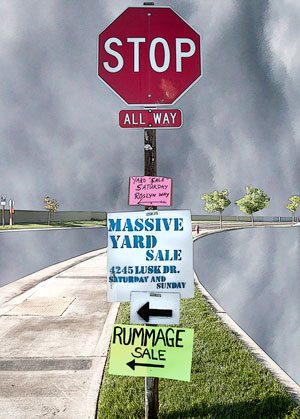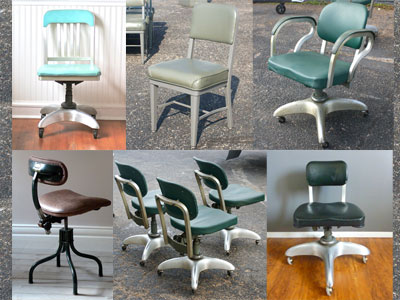One of the best things about hitting the road is a change in perspective. Getting a few miles, or a few hundred miles, outside your normal radius and routine can spur new ideas for financial features and economy stories to tackle when you get home.
I had that experience over the holiday when a few chance observations and conversations sparked ideas that easily can be localized in most regions and which I’ll share in upcoming posts.
On vacation, buzzing around an unfamiliar town in central Indiana – a rural town that clearly had seen better days – I impulsively stopped at a medium-sized scrap yard to search for a “shabby chic” addition to a home building project. What a revelation that was; in this economically depressed area, on a Saturday morning, there were six or eight local residents lined up with small amounts of metal to sell for pennies and dollars.
The pile of sold-off goods next to the paymaster’s window included useful items like shiny automotive wheels, galvanized metal trash cans, the cast-iron ends of a garden bench, and to my horror two mid-century aluminum office chairs in perfect condition.
I just checked and those very chairs, made by the General Fireproofing Co. of Youngstown, Ohio, from the 1930s onward, are going for $50 to $170 a piece on eBay; the salvage yard bought them for about 15 cents a pound – or less than one dollar a piece – and the only reason they hadn’t been smashed up yet was due to a backlog of work that morning. The yard attendant shrugged when I tried to exhort him to spare the chairs and offered to sell them to me for about $2; had my compact car been able to accommodate them they’d be beside me now.

He clearly wasn’t a devotee of “Mad Men” décor trends but did show me a corner where he’d set aside die-cast cars, children’s pedal cars, interesting old tin signs, brass knickknacks and other collectible, scarce or potentially valuable items. “There aren’t any jobs around here and people have to live,” remarked a bystander, seeing my pained expression.
In addition to worrying about the vintage wheelbarrows, garden gates and other “yard art” and antique-shop fodder about to be annihilated, I felt bad for the area residents streaming into the salvage center, some of them about to trade potentially valuable items for a fraction of their worth. It seems to me that via a visit to your area’s scrap yard, you could really pick up on some stories about people who haven’t fared well in the economic recovery, and the lengths to which they are going to get money for food, gas and other everyday expenses.
Later that morning at a tiny antique shop I related the chair anecdote to the shop owner and her basic response was “That’s nothing around here. A lot of people are selling their CARS for scrap to get money to keep going.” She was regaling me with a family friend’s tale when another customer chimed in with a related story. It apparently is more lucrative, in that area at least, for those in need of cash to sell a viable vehicle to the scrapyard to be “parted out” than to sell it on the market to another motorist or car lot. The stories behind why people are willing to part with operable vehicles – why they need cash so fast – could say a lot about your region’s place in the recovery.
The small town I was visiting also had a modest farmer’s market going, amid its mostly-shuttered downtown storefronts, with a few people selling garden plants and hand-made items; it being too early for produce to be harvested.
Down the street, a yard saleslady was offering birdhouses her son made out of car parts with spark-plug perches. Other yard and garage sales, and an area flea market, all part of the “informal economy” that seldom makes our radar, were a poignant snapshot of “Making ends meet on a Saturday morning in the Midwest” and I could actually envision a compelling set of prose or multimedia vignettes that would highlight what’s working and what’s not in the local economy.










